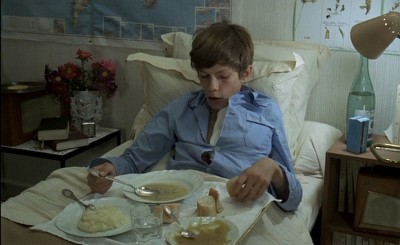Category: Cinema
Reviews of movies Adam has seen or films he has worked on.
A part of this viewing list: Criterion Collection Spine #328: Louis Malle’s Murmur of the Heart.

In the Criterion-associated strange synergies of my life I’ve had two separate works in two separate days that replay the story of Oedipus and his mother in new fashions. First, Murakami’s Kafka on the Shore, in which the 15 year old protagonist [might have] killed his father and definitely slept with his mother a few times and now Malle’s Murmur of the Heart in which the 14 year old main character has no love for his father and sleeps with his mother once. In these works, the revelation of the act is a precipice that allows for resolution. For me, the particulars aren’t important, but the manner of the revelation and the outcome of the act are. I don’t think this just applies to incest, but to any turning point in a narrative.
The manner and mechanism is premeditated by the author. The outcome is the character’s reaction to what has occurred. Very different functions.
In Murmur of the Heart, Malle uses a majority of the film to set-up an event that is nothing more than a simple edit. Yet that cut has the force of nearly two-hours of exposition behind it and is all the more powerful for its brevity. For Laurent, it serves as a successful springboard into adulthood in a film filled with unsuccessful attempt after unsuccessful attempt. The film recalled American Beauty in form and function, and while the Oedipal stuff is missing from that film, the same middle-class dissatisfaction that plagues Kevin Spacey’s character also fills Laurent’s mother. Her husband and her lover make no attempts to understand her, and Laurent seems to do so unconsciously. She comes to understand him and his understanding of her, and their love scene mirrors this change; from a child and mother cuddling, to a [n albeit] young man and a woman who love each other.
It almost seems appropriate that Laurent, whose whole life has been guided by his mother’s eye and his nascent adulthood almost smothered by her attention is “made a man” by her. His agency becomes more and more focused as the film progresses, and after he finally completes the sex act, he seems much more comfortable in his own skin. The film is permeated with great jazz music [which has been significantly whitewashed in recent times] that retains seeds of the shocking sexual frankness and danger that early jazz was associated with. The end result is a film that is a steady exposition of the pendulous dangers of coming-of-age and also a striking critique of the inadequacy of middle-class family life.

• Criterion essay by Michael Sragow
• Official Louis Malle site